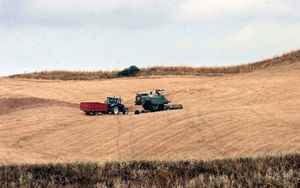(Finance) – More than 1 in 10 farms (11%) is in such a critical situation as to lead to the cessation of activity but well about 1/3 of the national total (30%) is still forced to work in a condition of negative income due to the increase in production costs . This is what emerges from the Coldiretti survey “The war on the plate” on the effects of the conflict on the agri-food chain presented at the opening of Cibus in the Coldiretti stand with the presence of the national president Ettore Prandini.
A tsunami that hit farms with increases in the purchase of fertilizers, packaging, diesel, tools and machinery that are putting the budgets in crisis. In the campagne there are increases in the costi ranging from + 170% of fertilizers to + 90% of feed to + 129% for diesel with increases in current costs of over € 15,700 on average but with peaks over € 47 thousand for dairy stalls and peaks of up to € 99 thousand for chicken farms, according to the Crea study. The impact of the surge in costs for all farms – specifies Coldiretti exceeds 9 billion euros.
However, the entire supply chain is in difficulty, which has found itself facing unilateral increases by suppliers of packaging such as glass, which costs more than 30% more than last year, but there is an increase of 15% for tetrapack. , 35% for labels, 45% for cardboard, 60% for tinplate cans, up to 70% for plastic, according to Coldiretti’s analysis. But the prices of orders change – adds Coldiretti – now from week to week, making normal economic planning in company costs impossible.
Road transport has also been increased by 25%, to which is added the worrying cost situation of containers and sea freight rates, with increases ranging from 400% to 1000%. In general, according to the global index Freightos, an important index in the shipping market, the current price of a container is equal to $ 9,700 compared to $ 1,400 a year ago.
It is the direct and indirect effects of expensive energy with agricultural and food production that in Italy absorb over 11% of total industrial energy consumption for about 13.3 million tons of oil equivalent (Mtoe) per year. THE Rising energy prices therefore have a devastating impact on the supply chain, from the field to the table. In the agricultural system, direct energy consumption includes fuel for tractors, greenhouses and transport, while indirect consumption includes those deriving from plant protection products, fertilizers and the use of materials such as plastic (4.7 Mtoe). On the other hand, the food sector requires – continues Coldiretti – large quantities of energy, especially heat and electricity, for the processes of production, transformation, conservation of products of animal and vegetable origin, operation of machines and air conditioning of production and work environments ( 8.6 Mtoe).
“We need responsibility on the part of the entire food chain with agreements between agriculture, industry and distribution to ensure a more equitable distribution of value, also by combating unfair practices in compliance with the law that prohibits purchasing food below production costs “affirms the president of Coldiretti Ettore Prandini underlining “the need for resources to support the sector at a time when a scenario of hoarding, speculation and uncertainty that must push the country to defend its food sovereignty “.
